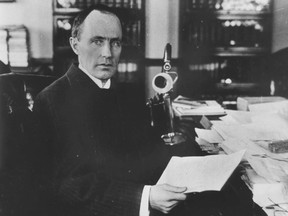On the 150th anniversary of the birth of the ninth prime minister Arthur Meighen, a select collection of excerpts from his most stirring speeches
Article content
It was March 15, 1909 and a rookie member of the House of Commons took to his feet for the first time in the chamber. Arthur Meighen, a newly elected Manitoba Conservative, rose to speak in favour of a resolution calling on the government of Sir Wilfrid Laurier to appoint “an able and practical farmer of the West,” to a vacant spot on the federal Board of Railway Commissioners.
Advertisement 2
Article content
Within minutes, more senior MPs of all parties, went silent as the new MP demonstrated a natural skill in parliamentary debate that few had ever seen before. Laurier, then in his 33rd year in the Dominion Parliament, turned to his seatmate and made the remark that would follow Meighen through history. “Borden,” he whispered, “has found a man.”
And that Borden had. A decade later, Meighen would be prime minister and his reputation for oratorial excellence would only grow. He was prime minister twice (in 1920-1921 and then again in 1926), and leader of the opposition as leader of his party on more than one occasion. Meighen would serve in both the House and Senate. In the latter, it was said that his skill in debate was so renowned that lineups for the public gallery would form when it became known that he would be delivering an address.
“He was incomparably the greatest parliamentarian and orator of my time, probably the greatest Canada had ever had, and from the first time I listened enthralled,” Senator and constitutional expert Eugene Forsey would write. “Never a note, never a repetition; every name, every date, every quotation impeccable; never at a loss; invincible with interrupters and hecklers; never ruled out of order. The speeches were masterpieces, alike in matter, structure, and manner; classical in their flawless English, memorable in their phrasing.”
Article content
Advertisement 3
Article content
Though largely forgotten today in this, his sesquicentennial year, it is fitting that we honour him. In an era when Canadian politics have sunk to lows of blind partisanship and anger that bring no credit to any party in Ottawa, Meighen’s words are worth recalling.
In them, we find love of country, respect for Parliament and all our ancient institutions, a belief in public service, and a celebration, not denigration, of past prime ministers and Canadian history itself.
We ignore Meighen’s words at our peril today.
— — —
Believe me, radio reaches all. The press is still a mighty faction, but radio gets to more than the press; it is easier to sit and listen than it is to direct one’s energies to reading. Radio has advanced to a status of influence and power hard indeed to exaggerate… Give a single party the radio between elections, and it won’t matter much whether there is an election or not. Just continue a single party monopoly of radio and you might as well sit up and recognize that fascism is here to stay. This (CBC board of directors) has given the Liberal Party a monopoly and they are using that monopoly with their eyes on the ballot morning, noon and night.
To the Conservative Party leadership convention, Winnipeg, Dec. 9, 1942, after the CBC refused to broadcast the convention, but still allowed Liberal cabinet ministers, and prime minister Mackenzie King, access to their airwaves.
Advertisement 4
Article content
We turn aside for a mere moment to pay tribute where tribute is due and to gain inspiration, if we can, courage if we can, wisdom if we can, at the foundation of history… Sir John Macdonald does not stand alone in the galaxy of our eminent men; but his greatest rival (Wilfrid Laurier), to his eternal credit, has awarded him the primacy among the founders and builders of our nation. For the heavier tasks of today, there is more to be learned from him than from any other. If we govern ourselves, each one of us, by the principles which governed him; if we work as he worked; dare as he dared; and follow that star that lighted his life, we will serve our country as we ought to serve it and, with God’s help, we will save it.
At the statue of Sir John A. Macdonald in Kingston’s City Park (now torn down on the orders of Kingston City Council) at the ceremony marking the 50th anniversary of the Father of Confederation’s death, June 7, 1941.

Here in the heart of Europe, we meet to unveil a memorial to our country’s dead. In earth which has resounded to the drums and trampling’s of many conquests, they rest in the quiet of God’s acre with the brave of all the world. At death, they sheathed in their hearts the sword of devotion, and now from oft-stricken fields they hold aloft its cross of sacrifice, mutely beckoning those who would share their immortality… In many hundreds of plots throughout these hills and valleys, all the way from Flanders to Picardy, lie fifty thousand of our dead… Above them are being planted the maples of Canada, in the thought that her sons will rest the better in shade of trees they knew so well in life. Across the leagues of the Atlantic the heartstrings of our Canadian nation will reach through all time to these graves in France; we shall never let pass away the spirit bequeathed to us by those who fell; “their name liveth for evermore.”
Dedicating the Cross of Sacrifice, Vimy Ridge, France, July 3, 1921.
Advertisement 5
Article content
It has not been my habit in life to colour or distort principles in which I believe, with the idea that they must be so shaped as to be popular. I shall not do so now. With all deliberation I say that democratic institutions cannot long survive unless public men proclaim honesty, and expound fearlessly, what they believe, as the outcome of experience and conscientious thinking, to be for the public good. The temporary results to themselves cannot be considered. Time, though slow in coming, will some day vindicate the right. There is more worth living for in the vindication than there is in office or honours.
Byelection address, Toronto, Ont., Feb. 6, 1942.
“There is nothing there but a disordered, disheveled, swirling, suffering, seething chaos of humanity, with assassination on top and starvation underneath.”
Describing life in Russia after the advent of communism, Aug. 21, 1920, Stirling, Ont.
I do not appeal to busy folks to study Shakespeare. I just say to you — Read him and enjoy him; read his works over; read the best of them, or those you like the best, and then read them over again, and keep on. You will discover that each time you like them better; that each time you get more out of them. There is nourishment for mind and soul rich and various all along his shores. You will find yourself gaining possession of a storehouse which is adding light and charm to your everyday existence. You will find yourself thinking more of your species, more of your friends and more of your enemies. You will realize that this man understood all of them; that he saw to the very depths of all of them; that he did not hate them but loved them, and that he loved them, if for no other reason, just because they were part of the great panorama and that every one of them added something to the astounding spectacle of creation. There never has been anything in all history more engaging than the fathomless sympathy of Shakespeare.
His famous tribute to William Shakespeare, The Greatest Englishman in History, the Canadian Club, Toronto, Ontario, Feb. 24, 1936.
Advertisement 6
Article content
St. Marys is St. Marys still. It is the old family home, and there cling to it endearing recollections which can circle around no other place on earth. This is the home of boyhood and young manhood, the home where first were learned those simple truths last to fade from the mind, the home of earliest friendships, the most sacred and inseverable of all, the home around which linger memories of brothers and sisters now far away and of one generation which has gone forever. Time changes much. It destroys and builds again, but the attachments and affections I have described abide to the end.
On his first visit to his hometown of St. Marys, Ontario, since becoming prime minister, Aug. 16, 1920.
Never before in the Dominion has such a subject been made an election issue, and certainly, not for very many generations, has the head of any party in Britain sought to divide the people of that country over conduct of the occupant of the Throne. The undesirability of such a schism is just as great in Canada as it is in Britain. For purposes of his own, Mr. King has made himself author and parent of the controversy. This responsibility, I make bold to say… he has taken with a very plain object (retuning to power at all costs) but without any justification whatsoever.
Campaign speech during the King-Byng constitutional crisis, Cobourg, Ont., Sept. 13, 1926.
Advertisement 7
Article content
Mr. Speaker, my desire is to extract as fairly as I can what there is of substance in the speech delivered by the Leader of the Opposition in the way of an attack on the position assumed by the present government—to extract it and place it before the House in such forum that at least the House can understand what the attack means and what was the argument by which it was sought to support that attack. I will have to drag the substance from under a mass of hyperbole, but the effort must be made. I may have the aspiration—but if I have I certainly have not the talent—to rival my honourable friend in the power of declamation, a power that he has exercised throughout most of his life and which he has brought to some degree of perfection.
Answering his Liberal opponent, Mackenzie King, House of Commons, Feb. 15, 1921.
“There is only one boast I can ever make. Not a boast in any triumphant success – not at all – but I think I can say this, which not all could say, that I never rose there (in Parliament) and sat down without having done the best that was in me. And what is more important, I cannot let you go away without acknowledging that I had much of the adventitious by way of example to help me; in many ways I was fortunate. Indeed, I was almost incredibly fortunate in the fine men who stood around me, against me and in the fine men who stood with me. I tried to take advantage of what they had to give and of their abundance they gave me much.”
His last major address, Arthur Meighen tribute dinner, Toronto, Ont., Dec. 3, 1957.
— Kingston’s Arthur Milnes, a past speechwriter to then prime minister Stephen Harper, and the memoirs’ assistant to Brian Mulroney, is the editor of 2011’s Unrevised and Unrepented II, a collection of the Rt. Hon. Arthur Meighen’s speeches.
Our website is the place for the latest breaking news, exclusive scoops, longreads and provocative commentary. Please bookmark nationalpost.com and sign up for our politics newsletter, First Reading, here.
Article content






